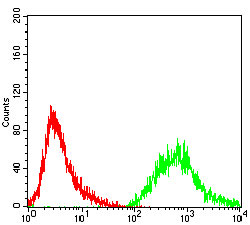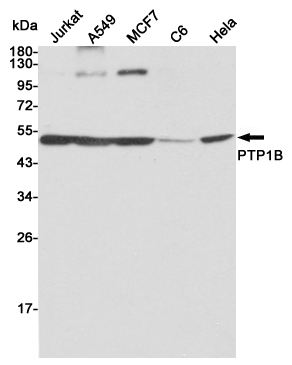-
Product Name
Anti-PTP1B Mouse antibody
- Documents
-
Description
PTP1B Mouse monoclonal antibody
-
Tested applications
WB, FC
-
Species reactivity
Human
-
Isotype
Mouse IgG1
-
Preparation
Antigen: Purified recombinant fragment of human PTPN1 (AA: 40-246) expressed in E. Coli.
-
Clonality
Monoclonal
-
Formulation
Purified antibody in PBS with 0.05% sodium azide.
-
Storage instructions
Store at 4°C short term. Store at -20°C long term. Avoid freeze / thaw cycle.
-
Applications
WB: 1/500 - 1/2000
FC: 1/200 - 1/400
ELISA: 1/10000
-
Validations

Flow cytometric analysis of A431 cells using PTP1B mouse mAb (green) and negative control (red).

Western blot detection of PTP1B in Jurkat, A549,MCF7,C6 and Hela cell lysates using PTP1B mouse mAb (1:2000 diluted).Predicted band size:50KDa.Observed band size:50KDa.
-
Background
Swiss-Prot Acc.P18031.The protein encoded by this gene is the founding member of the protein tyrosine phosphatase (PTP) family, which was isolated and identified based on its enzymatic activity and amino acid sequence. PTPs catalyze the hydrolysis of the phosphate monoesters specifically on tyrosine residues. Members of the PTP family share a highly conserved catalytic motif, which is essential for the catalytic activity. PTPs are known to be signaling molecules that regulate a variety of cellular processes including cell growth, differentiation, mitotic cycle, and oncogenic transformation. This PTP has been shown to act as a negative regulator of insulin signaling by dephosphorylating the phosphotryosine residues of insulin receptor kinase. This PTP was also reported to dephosphorylate epidermal growth factor receptor kinase, as well as JAK2 and TYK2 kinases, which implicated the role of this PTP in cell growth control, and cell response to interferon stimulation. Two transcript variants encoding different isoforms have been found for this gene.
Related Products / Services
Please note: All products are "FOR RESEARCH USE ONLY AND ARE NOT INTENDED FOR DIAGNOSTIC OR THERAPEUTIC USE"
